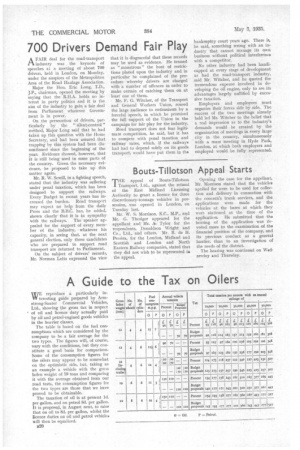700 Drivers Demand Fair Play
Page 34

If you've noticed an error in this article please click here to report it so we can fix it.
AFAIR deal for the road-transport industry was the keynote of speeches at a meeting of about 700 drivers, held in London, on Monday, under the auspices of the Metropolitan Area of the Road Haulage Association.
Major the Hon. Eric Long, T.D., J.P., chairman, opened the meeting by saying that the R.H.A. holds no interest in party politics and it is the aim of the industry to gain a fair deal from Parliament whatever Government is in power.
On the persecution of drivers, particularly by the " silent-control " method, Major Long said that he had taken up this question with the Home Secretary, and had been assured that trapping by this system had been discontinued since the beginning of the year. Evidence showed, however, that it is still being used in some parts of the country. Given the necessary evidence, he proposed to take up this matter again.
Mr. R. W. Sewill, in a fighting speech, stated that the industry was suffering under penal taxation, which has been designed to support the railways. Every Budget in recent years has increased the burden. Road transport may expect no help from the daily Press and the B.B.C. has, he added, shown clearlythat it is in sympathy with the railways. The speaker appealed for the support of every member of the industry, whatever his capacity, in seeing that, at the next general election, only those candidates who are prepared to support road transport are returned to Parliament.
On the subject of drivers' records, Mr. Norman Letts expressed the view that it is disgraceful that these records may be used as evidence. He termed as " monstrous" the host of restrictions placed upon the industry and in particular he complained of the procedure whereby drivers are charged with a number of offences in order to make certain of catching them on at least one of them.
• Mr. F. G. Witcher, of the Transport • and General Workers Union, roused the large audience to enthusiasm by a forceful speech, in which he promised the full support of the Union in the campaign for fair play for the industry.
Road transport does not fear legitimate competition, he said, but it has to compete with penal taxation and railway rates, which, if the railways had had to depend solely on its goods transport, would have put them in the bankruptcy court years ago. There is, he said, something wrong with an industry that cannot manage its own business without political interference with a competitor.
No other industry had been handicapped at every stage of development as had the road-transport industry, said Mr. Witcher, and he quoted the tremendous expense involved in developing the oil engine, only to see its advantages largely nullified by excessive taxation.
Employers and employees must organize their forces side by side. The success of the two meetings already held led Mr. Witcher to the belief that a real impression as to the industry's demands would be created by the organization of meetings in every large city in the country, simultaneously with a mass meeting in Hyde Park, London, at which both employers and employed would be fully represented.




























































































